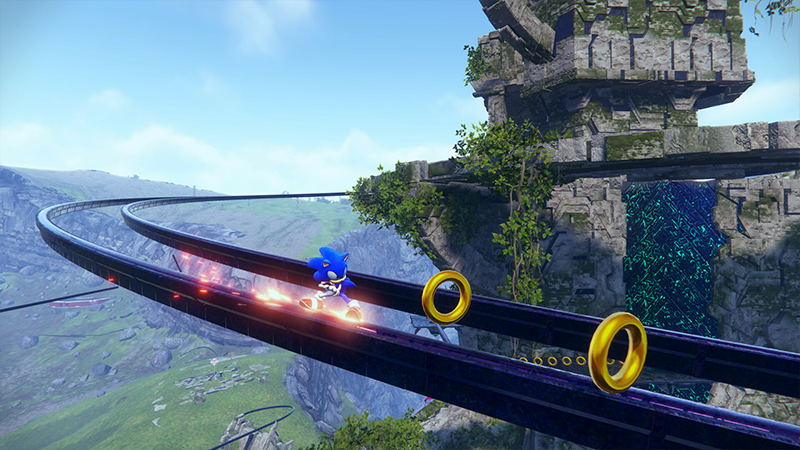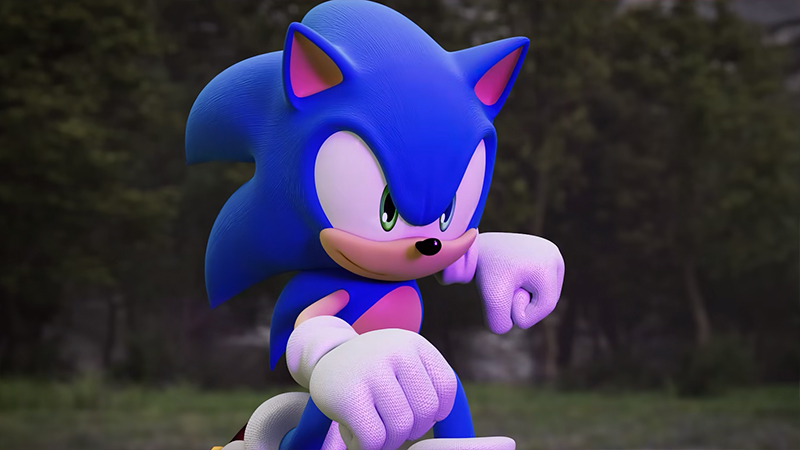The Sonic franchise has always had its ups and downs, failing to ever find the consistency that its mustachioed rival had within the 3D space. Sonic Frontiers is Sonic Team’s latest effort to reinvent the franchise and boldly emphasizes exploration within vast maps rather than the linear blasts of levels that fans have come to expect. The change is certainly refreshing and mostly for the better, although there are still plenty of open-world kinks and rough edges to iron out.
The largest issue that the open-world environments have is apparent from the start and partially why its reveal was so heavily scrutinized: Its maps are profoundly empty. Rather than feeling like an actual, realized world, the game looks like a work-in-progress stage with objects, enemies, and missions haphazardly strewn about with little thought paid to its aesthetics. It’s an off-putting look initially, and when paired with the noticeable pop-in that causes objects to appear out of nowhere, it doesn’t make the greatest first impression.

But after coming to terms with the barren maps with generic themes, the game can more properly show off its pretty satisfying core gameplay loop. Segments of the map are filled in by finding missions within the world, and these tasks can range from cool obstacle courses that take advantage of Sonic’s various speedy skills and hone in players’ abilities to solve puzzles. Once filled in, the character memory collectibles that gate progress and the portals that take players into the more traditional 2D and 3D digital stages become easier to find.
The sense of exploration when entering a new map for the first time is certainly the highlight of Frontiers. It’s exhilarating to ride the various rails and leap off the jump pads to find new areas, all the while collecting the memories that are generously scattered about. There are also some pretty involving mid-bosses to find while exploring, some of which are almost Shadow of the Colossus-style behemoths that need to be climbed. It’s an unexpected addition and when combined with the more open formula that the franchise hasn’t seen thus far, Frontiers is engaging mystery early on that continually doles out new surprises.
RELATED: Ranking the Sonic the Hedgehog Cartoon Series Before Sonic Prime
However, as the shockingly lengthy experience goes on, the rate of surprises and new enemies begins slowing down. What starts out as a fresh way to use Sonic’s skills becomes increasingly second nature a little more rote, especially when fighting its occasionally wonky physics and set pieces that don’t quite come together. Although even at its most repetitive, the tasks are still generally fun to tackle because the core maneuverability and sense of speed remains a joy, so it becomes a solid game to mindlessly hack away at while listening to podcasts or audiobooks.

While “mindless” can seem like a pejorative, it illustrates how Frontiers‘ mechanics form a solid enough base to work from and why it begs for a sequel to streamline its kinks. Speeding around and taking down huge, level-ending bosses are where it excels and it just needs a better and more complete game around those core mechanics. Instead of a drab and realistic art style, a more cartoonish direction — like some of the ones in the brief digital stages — would fit the game better and inject more life into it. Frontiers‘ stages would also be more cohesive if their ramps and pathways were naturally built into the environment instead of weirdly dropped around as if placed by an algorithm.
These weaknesses chip away at the game’s quality but are tertiary shortcomings that sequels are naturally built to address. Frontiers is a bold execution of the Sonic formula, so it’s understandable that Sonic Team stumbled when going this fast into new territory. Director Morio Kishimoto also noted that the studio was taking in feedback, reinforcing the idea that Frontiers needs some refinement to fully realize its potential. A follow-up would ideally smooth out its rough edges and allow its great premise of dropping Sonic in a more open area to flourish.
While Sonic Frontiers‘ appeal starts to wear as it goes on, and players may have their fill after the first few maps, it’s undeniably a fresh reinvention that sets the table for something truly great. If the next Sonic game can more naturally incorporate activities into the open-world environments and improve the physics, it could be a truly great game rather than one with some great moments sprinkled throughout.










